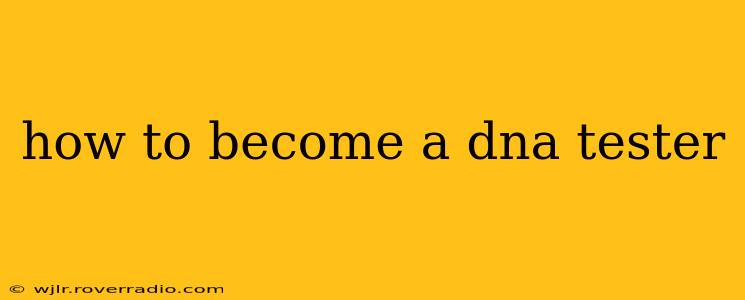The field of DNA testing is rapidly expanding, offering exciting career opportunities for those with a passion for science and a keen eye for detail. But becoming a DNA tester isn't a straightforward path; it requires specific education, training, and experience. This guide will explore the necessary steps and considerations for anyone aspiring to a career in this fascinating field.
What Does a DNA Tester Do?
Before diving into the how-to, let's clarify what DNA testers do. They're involved in various stages of the DNA testing process, including:
- Sample Collection and Processing: This involves meticulously collecting DNA samples (blood, saliva, cheek swabs) while adhering to strict protocols to prevent contamination. Subsequent processing may include DNA extraction and purification.
- DNA Analysis: This is where the core expertise lies. Testers use advanced techniques like PCR (Polymerase Chain Reaction) and capillary electrophoresis to analyze DNA samples, identifying specific genetic markers or sequences.
- Data Interpretation: Interpreting the results of DNA analyses requires a strong understanding of genetics and bioinformatics. This often involves comparing the sample to a database or to other samples.
- Quality Control: Ensuring the accuracy and reliability of results is paramount. DNA testers play a critical role in maintaining quality control throughout the entire process.
- Reporting: Finally, testers compile comprehensive reports detailing their findings, which are often used in forensic science, paternity testing, ancestry research, or medical diagnostics.
What Education and Training Do I Need to Become a DNA Tester?
The educational requirements for becoming a DNA tester vary depending on the specific role and employer. However, a strong foundation in science is essential. Common pathways include:
- Bachelor's Degree: A bachelor's degree in biology, genetics, molecular biology, biochemistry, or a related field is usually the minimum requirement. Strong coursework in genetics, molecular biology, and statistics is crucial.
- Master's Degree: For more advanced roles, a master's degree in a relevant field can significantly enhance career prospects. A master's degree often provides specialized training in forensic science or genetic counseling.
- Doctoral Degree (PhD): A PhD is typically required for research-oriented positions or for leading teams within a DNA testing laboratory.
- Laboratory Experience: Practical laboratory experience is invaluable. Internships, research assistant positions, or volunteer work in a relevant lab setting provide hands-on skills and build your resume.
- Certifications: Some certifications, such as those offered by professional organizations like the American Society of Human Genetics (ASHG), can demonstrate competence and improve job opportunities.
What are the Different Types of DNA Testing Jobs?
The field offers diverse career paths:
- Forensic DNA Analyst: Analyzing DNA evidence for law enforcement agencies.
- Clinical Laboratory Scientist: Performing DNA tests for medical diagnostics.
- Genetic Counselor: Advising patients and families about genetic testing and its implications.
- Research Scientist: Conducting research on new DNA testing methods and applications.
- Bioinformatician: Analyzing large datasets of genetic information.
How much does a DNA tester make?
Salary varies widely depending on experience, location, and employer. Entry-level positions may offer a starting salary in line with other scientific positions, while experienced professionals and those with advanced degrees earn significantly more. Researching salary data for specific locations and job titles is recommended.
What skills are necessary for a successful career in DNA testing?
Beyond education and training, certain soft skills are crucial for success:
- Attention to Detail: Accuracy is paramount in DNA testing.
- Problem-Solving Skills: Troubleshooting technical issues is a regular part of the job.
- Analytical Skills: Interpreting complex data requires strong analytical skills.
- Communication Skills: Clearly communicating results to colleagues and clients is essential.
- Teamwork: Many DNA testing labs operate as teams.
Are there any specific ethical considerations for DNA testers?
Ethical considerations are critical. DNA testers must adhere to strict confidentiality protocols, handle samples with utmost care, and ensure the accuracy and reliability of their results. Maintaining ethical standards is crucial for upholding public trust and maintaining the integrity of the field.
By pursuing the right education, gaining practical experience, and developing essential skills, aspiring DNA testers can embark on rewarding careers contributing to scientific advancements and impacting countless lives. Remember to continuously update your skills and knowledge to stay current with the ever-evolving field of genetics.
